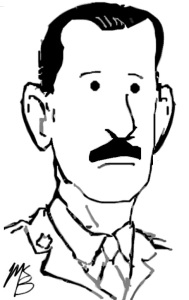Lieutenant-Colonel W.J. Moogk
Royal Winnipeg Rifles

For a long time, people here considered us a rowdy crowd of over-paid, over-sexed soldiers … At one time we had higher figures in crime and venereal disease in the Canadian army than all the rest, with only one-third the number of people the others had.
(Quoted in North Bay Nugget, 16 Dec 1952, 5)
Born on 18 August 1910 in Waterloo, Ontario, Willis John Moogk graduated from RMC in 1934 and immediately took a commission with the Royal Canadian Regiment, explaining his motivation: “he had become used to eating three meals a day.” He served as adjutant when the RCR went overseas in December 1939 and was promoted to major six months later. Four of his children would be born in England while he was stationed there with his wife.
After attending staff college and a tenure as brigade major, Moogk took command of the Royal Winnipeg Rifles, succeeding newly promoted Brigadier T. Graeme Gibson in July 1942. After five months, he returned to staff officer duties and was succeeded by Lieutenant-Colonel J.M. Meldram. While the RWR went ashore at Juno Beach on D-Day eighteen months later, Moogk helped to plan the Allied invasion of Normandy. In April 1944, he had been assigned as the principal Canadian staff officer in the Build Up Control Organization, which handled the enormous logistical task of moving men and equipment ahead of Operation Overlord.
For his role as head of the Canadian section in the invasion planning and execution, Moogk was made Officer of the Order of the British Empire:
As such, he has been responsible for all detailed staff work involved in the build up of the First Cdn Army within the continental bridgehead … These responsible and onerous duties he has performed, without supervision or assistance, with outstanding distinction, thereby contributing in a notable manner to the success of operations.
During the Northwest campaign, Moogk served as assistant adjutant and quartermaster of the Canadian section at the 21st Army Group headquarters. He participated in the planning for the liberation of the Netherlands and in September 1945, he returned home to be general staff officer for Military District No. 1.
During the Korean War, he served in Far East as chief administration officer with 25th Brigade headquarters in Kure, Japan. After Japanese complaints about the rowdy behaviour of Canadian troops in the city, Moogk admitted the troops had earned a reputation as “over-paid, over-sexed soldiers.” His time in the country nevertheless resulted in a new appreciation for Japanese culture, as he later reflected:
I went there in the midst of wartime propaganda. Affected by the beauty of the country and overcome with affection for the people, my views transformed and I decided I would like to give people everywhere a true picture of Japan.
He ended a thirty-year military career as commandant of Camp Borden with the rank of brigadier. He retired to his home in Niagara-on-the-lake, Ontario where he devoted energy to the preservation and restoration of Canadian history and heritage.
As president of the Niagara Historical Society into the 1970s, he advocated for truth over myth, and objectivity over national pride in the study of the past. Of the legacy of the American Revolution he told an audience in Buffalo, “Suspicion of invasion became part of our national soul. The revolution still remains a barrier to our seeing each other clearly.”
He died in Niagara in 1990.